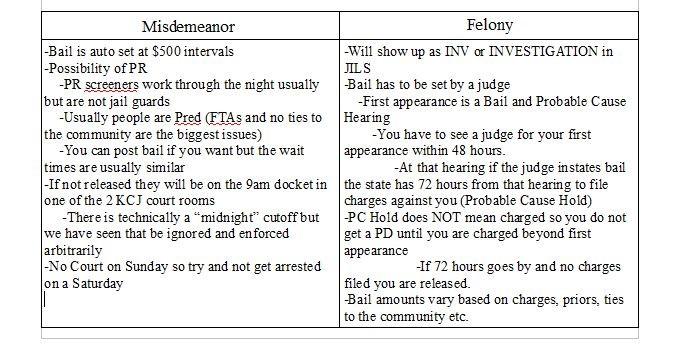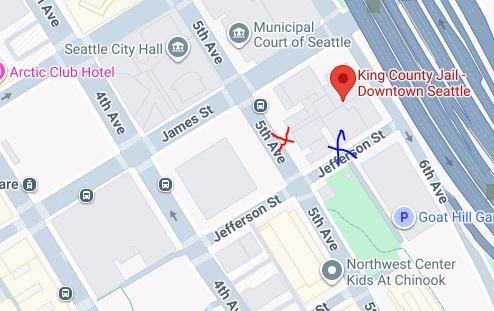For this tutorial we will walk you through providing jail support for people arrested at a political demonstration in Seattle, WA. Aspects of this write up can be used in other scenarios as well though. The information here is current as of the writing in October 2025, but jail policies are subject to change at any time. And as always, we are not lawyers and we are not offering legal advice.
Scenario: There is a demonstration in downtown Seattle and you witness a total of 6 arrests. You know 3 of the people arrested and have their legal names because they filled out an arrest will before hand. The other 3 are people you don’t know and don’t have the legal names of.
Arrest Will: A document that is filled out before a possible arrestable scenario like a demo or protest. The document is held off-site from the action and helps guide the people doing support about the arrested persons needs and wants. They include (but are not limited to) -Legal Name on your ID, important medical info including any any DAILY life saving medications, the contact of who to call if you are in jail past a certain point (Boss, Partner, Teacher etc.) whether you want to be bailed out, and under what circumstances? any needs to be taken care of at home (Pets, car moved, etc.)? The contact of who can make decisions for you if you are unreachable?
At the end of the demo, the 6 people arrested are transported by the Seattle Police Department (SPD) away from the scene to be processed. After they are booked into jail they will show up in the Jail Inmate Lookup Service online database. There is a specific guide for using JILS. The process of being booked and showing up in the database can take several hours, and the time will lengthen depending on the chaos of an arrest situation. Additionally, there are some scenarios where someone will not show up in JILS:
- If someone requires emergency medical care due to an arrest, often they are taken to Harborview Medical Center for treatment, and then the jail – they will not appear in the online database while receiving medical care at Harborview.
- Catch and Release: Sometimes arrestees are first transported to the closest police precinct and held there, then released without being booked.
Post-Booking
A few hours post arrest the names of the 3 people you know; Dave, Marshall, and Scott show up in JILS. Marshall and Scott are being held on misdemeanors with bails of $500 and $1000 respectively. Dave is being held on felony. In King County bail at the misdemeanor level is set automatically in $500 increments based on the offense. It is very common for people charged with misdemeanor offenses to be released from the jail overnight on Personal Recognizance (PR).
Personal Recognizance (PR) is when someone is interviewed in the jail by a third-party “PR screener” to ascertain if they are either a “flight risk” or present a “danger” to the community.
If someone is released on PR they do NOT need to pay bail to be released that night and they will receive a court summons in the mail for their next court date. This not a complete certainty, and there is no guarantee on a time-frame. What this means is that it is often unnecessary to post bail for someone who has been arrested for a misdemeanor crime – they are often released from jail without bail within a manner of hours.
Often is a relative term here, and there is a certain amount of guesswork involved. Our experience is that someone with a misdemeanor arrest, who has an address, a job, and discernible “ties to the community” will be PRed. The process is as classist and racist as it sounds.
The only way to know this is happening is a combination of watching the online database, and sitting outside the jail and waiting The jail roster will often initially show a bail amount for misdemeanor arrests, which will later change to PR. The process for arrestees to get screened for PR can happen quickly after booking but can also take several hours. Marshall and Scott are able to PR’ed that night, Dave who is on a felony or “Investigative” hold is not.
If someone has been arrested and the police are accusing them of a felony, they will be held in the jail under an Investigative/Investigation Hold (INV), in this scenario they can not be bailed out until they see a judge who sets bail- usually the next day. Those arrested Monday through Friday will typically see a judge the next day, as long as the arrest occurred before midnight. Those arrested on Saturday will have court on Monday. The maximum amount of time they can be held without seeing a judge is 48 hours. Typically when they have their first court date, the district court judge will either release them on PR or set a bail amount.

Releases
Is this scenario you follow a few different options given the wants of the different people arrested, and they lead to specific outcomes.
Personal Recognizance
Scott does not want to be bailed out and indicated on his arrest will that he would like to wait until he sees a judge to be released even though it means staying in jail overnight. After processing, Scott talks to a PR Screener and is granted release. He is released at 11:30pm, which is 5 1/2 hours after his arrest.
Bail
Marshall would like to be bailed out and not spend the night in jail, they have indicated this on their arrest will. Their bail is set at $500. You bring the money in cash to the King County Jail before 10pm when they close. At the KCJ you tell the cops in the lobby that you are there to pay a bail. They don’t let you bring in
your phone/other items so you put them in the free code-operated lockers to the right side before you go through security. Past security, you turn LEFT and go up the stairs to the jail visitor waiting area. At the customer service window, you say “I am here to pay bail”, and give them your ID (and address) and Marshall’s legal name as it appears in JILS. You do this knowing that your name will be publicly accessible as having paid this bail. Once you pay and everything is complete, they give you a half pink sheet that is your bail receipt. KEEP THIS. Once the case is over (which can take years) you contact the court to get the bail funds returned. As long Marshall showed up to all of their court dates, you should get all of the money posted returned to you. Marshall is released at 1:30am which is about 5 hours after you posted it.
If you did not have the cash available (Don’t forget ATM withdraw limits and banking hours) you could have enlisted the support of the Northwest Community Bailfund.
Court
Dave is being held on a felony, so regardless of his wants- he has to see a judge before his case/release can move forward. Thankfully was set for the next days felony calendar docket so he sees the judge on the 2pm calendar the day after his arrest. At that hearing Dave has bail set at $3,000. You choose to pool resources internally inside your friend group-Dave is a very private person and you don’t think he would like for a public ask to be made even anonymously since it is so easy to link that ask to his arrest through news articles about the demonstration. The other option would have been to ask the Northwest Community Bailfund for support in this scenario. Dave is released about 4 hours after you post his bail.
Regardless of the methods of release the process of walking out of the building is generally the same. The King County Jail has a main entrance on 5th Avenue (red X below), this is where the bulk of releases happen from. After hours, and late night releases often happen at the secondary exit on Jefferson St (blue X below). At times, people are randomly released onto 6th avenue even though it is not an “official” exit point.

In our scenario, Marshall and Scott are released onto Jefferson St, and Dave is released onto 5th Ave. All 3 are greeted on their release because there are supporters waiting outside both exits. But, if there had not been people waiting, those released onto Jefferson (or randomly onto 6th) would know to meet supporters out front on 5th avenue because they had all talked about the rendezvous point before hand.
Once all 3 are released and they have had a chance to shower, eat a good meal and hug their dogs and cats- they contact PSPS and ask for help navigating the post-release and possible criminal trial process ahead of them.